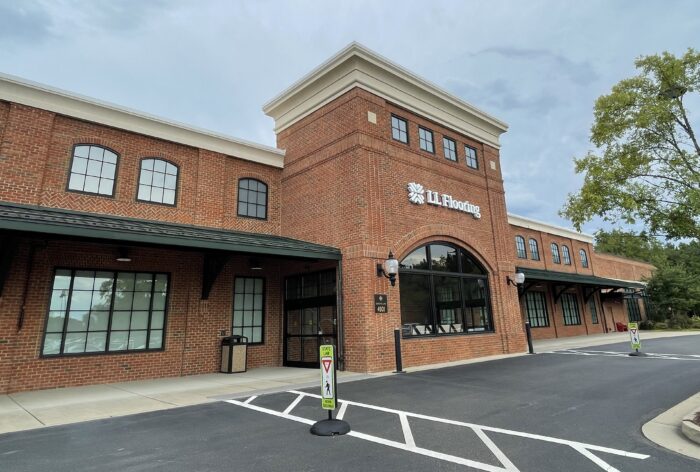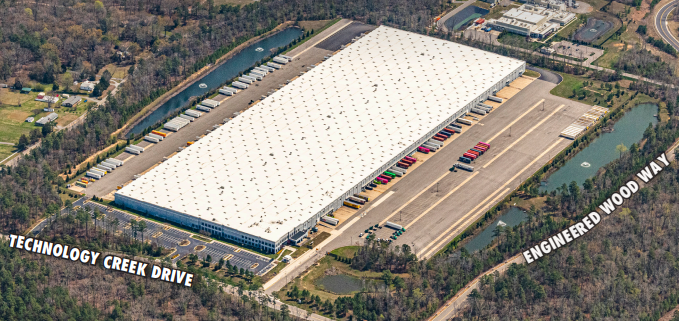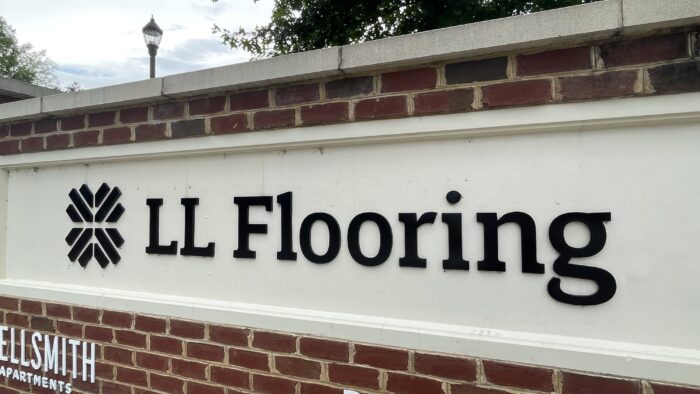A sign out front of LL Flooring’s Henrico headquarters (BizSense file photo)
In an abrupt reversal just days after announcing it would go out of business entirely, LL Flooring may have a new lease on life thanks to an eleventh-hour deal with its founder and former CEO.
The bankrupt Henrico-based retailer on Friday said it struck an agreement for a “going-concern” sale to F9 Investments, a firm run by Thomas Sullivan, who founded LL as Lumber Liquidators 30 years ago.
The company said F9 will acquire 219 of LL’s 430 stores, along with the store’s inventory and that of the company’s massive distribution center in Sandston. Also included in the deal is LL’s intellectual property.
The sale is expected to be completed by the end of the month, the company said, and is subject to bankruptcy court approval.
The deal was disclosed three days after LL’s public announcement that it was pivoting away from the possibility of a sale and into full-scale liquidation of all its assets. That included closing all of its stores and initiating layoffs of its employees, including hundreds in the Richmond area.
News of the liquidation spread nationwide last week before the company disclosed in court filings and then in a press release its reversal to a sale with F9.
If approved, the sale would put control of LL back into the hands of Sullivan, who founded the company as Lumber Liquidators in the mid-1990s in New England. Under Sullivan’s leadership, Lumber Liquidators went public on the New York Stock Exchange in 2007, grew to hundreds of stores and saw its stock price peak at $119 per share.
But then the company’s fortunes began to sour in 2015, when it was the subject of a damning “60 Minutes” exposé related to claims of unsafe levels of formaldehyde in flooring it had imported from China. It also pleaded guilty in 2015 to federal environmental crimes related to its imports from the Russian Far East. Sullivan left the company a year later in 2016.
Those episodes harmed its reputation to the point that it sought to rebrand. The result was the LL Flooring brand, which was unveiled in 2022; however, the company said that name has been slow to catch on.

LL Flooring’s headquarters at Libbie Mill Midtown. (BizSense file photo)
Its stock had been on a steady decline ever since, particularly over the last two years as the company turned down several offers from prospective buyers. Earlier this year it revealed in its earnings statements that its ability to continue to operate was uncertain.
It posted a loss of nearly $29 million in the first quarter of this year, on top of an annual loss of $103 million in 2023, and disclosed that it only had $8 million of cash on hand with which to operate.
It filed for Chapter 11 bankruptcy on Aug. 11 with a plan to find a buyer for the bulk of its assets. While it received offers from suitors since the filing, including F9, the company said earlier this month it was unable to come to a suitable deal.
That’s when it announced the liquidation pivot, only to reverse course. It said that while it was moving forward with the full liquidation it received a revised bid from F9 that spurred a change in direction.
The exact terms of the revised F9 offer weren’t immediately clear from documents filed with the bankruptcy court.
F9, which is LL’s largest shareholder, had previously proposed an asset purchase plan valued at roughly $66 million, through which it would have kept 219 of the chain’s stores and retained 750-1,000 employees. However, that offer was rejected by LL.
F9 put down an escrow deposit of $4.1 million for this latest deal.
Charles Tyson, LL’s president and CEO, said in a prepared statement on Friday, “We are pleased to have reached this agreement with F9 Investments for a going-concern sale following significant efforts by our team and advisors to preserve the business and maintain ongoing operations.
“As we move through the court-supervised process toward the approval and completion of this transaction, we remain committed to continuing to serve our valued customers and working closely with our vendors and partners,” Tyson said.
F9 representatives could not be reached for comment by press time.

The company’s massive distribution center in Sandston remains up for sale. (Courtesy JLL)
The company said the 219 stores that are part of the sale remain open for business, as do its online sales systems.
As for the 211 stores that F9 is not buying, LL said closing efforts for those locations have begun.
It’s unclear exactly what the sale would mean for LL’s 2,000 employees, including the 419 local workers who had been issued layoff notices last week. That total included 300 workers at its Libbie Mill headquarters and 119 employees at its 1 million-square-foot distribution center in Sandston.
It’s also unclear what the F9 deal means for the proposed sale of the Sandston facility at 6115 Technology Creek Drive.
Listed as the company’s most valuable asset, the property had been listed for sale to drum up extra cash prior to the bankruptcy filing.
Court filings last week showed that an entity tied to data center giant QTS was under contract to purchase the site for $104 million in a deal that was to close Sept. 30, and would have included leasing some space back to LL in the interim.
A hearing to consider the F9 deal is set for Sept. 16 at 11 a.m. in Delaware bankruptcy court, where LL’s Chapter 11 case is playing out.
Correction: An earlier version of this story incorrectly stated LL’s IPO date as 1997. The company went public in 2007.



:max_bytes(150000):strip_icc()/GreenBlue84byFarrowBall-6774d582ab9748c29fad4b4b902b8317copy-350e14d3e2b8488e951ac03dfd76ca0f.jpg)




